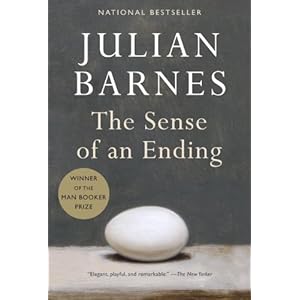Mr. Eugenides, Pulitzer prize-winning author of Middlesex, has given us a novel about the demise of the novel. It’s also a story that’s mostly about sex and its various permutations, but not really much about marriage, and equally about religion and its sundry incarnations, but not much about God. And I think the emphasis on sex and religion rather than on the core spiritual relationships of man and woman (marriage) and God and man (the core of religion) is an emphasis that is intended to say something about our culture and what we’ve lost in the twentieth century. Perhaps the idea is that we’ve reduced marriage to sexual attraction and sexual athletics, and we’ve reduced knowing God to going through the forms and expressions of religion and being good. Or maybe that’s just what I saw in the book.
 Madeleine is an English major at Brown University in the 1980’s (Eugenides attended Brown), and as the story begins she’s about to graduate, has just broken up with her boyfriend, and has a massive hangover. The story moves back and forth in time a lot, beginning each section with a crisis moment and then going back in time to show us how the characters got to that crisis. However, this narrative technique isn’t confusing at all, and I rather liked it for some reason. Maybe it helped to hold my interest when the major characters weren’t terribly sympathetic or likable.
Madeleine is an English major at Brown University in the 1980’s (Eugenides attended Brown), and as the story begins she’s about to graduate, has just broken up with her boyfriend, and has a massive hangover. The story moves back and forth in time a lot, beginning each section with a crisis moment and then going back in time to show us how the characters got to that crisis. However, this narrative technique isn’t confusing at all, and I rather liked it for some reason. Maybe it helped to hold my interest when the major characters weren’t terribly sympathetic or likable.
So, after having been introduced to Madeleine and the culmination of her last semester in college, we go back in time to see how she met, mated, and lost the boyfriend, Leonard Bankhead, how she came to major in English with an emphasis on the Victorian authors, and how she got the hangover. At a certain point, charismatic loner Leonard becomes the focus of the novel with his sparkling wit and intelligence, his brooding good looks, and his secret backstory that no one at Brown knows, not even Madeleine.
However, there is a third character who makes up the final point of this attempt at a modern, 21st century love triangle story, Mitchell Grammaticus. Mitchell, who’s been in love (or has he?) with Madeleine since their freshman year at Brown, is geeky, intelligent, and religious. He’s graduating with a major in Religious Studies, but he’s not sure what religion he believes in or where he’s going after college. So, he and his friend Larry decide to travel to India via Paris and Athens to see the world and wait for the economy to improve and inspiration to strike. Or maybe Mitchell is really waiting for Madeleine to realize that Leo Bankhead is a loser and that he, Mitchell, is the man she should marry.
The book is a mixture. There are some lovely and thought-provoking scenes in the novel that made it worth the investment of time, energy and slogging through (mostly sexual) sludge that it took to read the book. In one scene Mitchell encounters an evangelical Christian in the American Express office in Greece. The Christian girl witnesses to Mitchell in a rather formulaic, but sincere, way and tells him that if he accepts Christ as his Saviour, he can ask the Holy Spirit to give him the gift of tongues and he’ll be changed, completed. Mitchell tries it out, praying on the Acropolis, but nothing happens. “He was aware inside himself of an infinite sadness. . . He felt ridiculous for having tried to speak in tongues and, at the same time, disappointed for not having been able to.”
Another scene has Leonard trying to explain the experience of clinical depression to Madeleine who wants him to just try to pretend to want to be healthy.
“What’s the matter with me? What do you think? I’m depressed, Madeleine. I’m suffering from depression. . . .”
“I understand you’re depressed, Leonard. But you’re taking medication for that. Other people take medication and they’re fine.”
“So you’re saying I’m dysfunctional even for a manic-depressive.”
“I’m saying that it almost seems like you like being depressed sometimes. Like if you weren’t depressed you might not get all the attention. I’m saying that just because you’re depressed doesn’t mean you can yell at me for asking if you had a good time!”
Whatever you think about depression and its manifestations, isn’t this conversation just exactly the kind of conversation couple might have in this situation, coming at the problem from totally opposed viewpoints, trying to understand, but failing?
I’m tempted to recommend this book, in spite of all the sludge, in spite of the ending, which I hated, just because I’ve been thinking about it and mulling over the characters and their motivations and their mental pathologies all week long. I want someone to explain the entire book to me, wrap it up in a nice bow, but I don’t think this is a book that’s meant to gift-wrapped. Alternatively, I want to explain some things to Mitchell and to Madeleine and to Leonard, but I’m not sure I’d know where to start. I’m afraid I’d come across like Christian-girl-in-Greece, saying “Jesus is the answer!” in a way that sounds trite and essentially useless. Mitchell’s search for Truth, especially, is so frustrating to me as a Christian, yet so very typical of the people I see, searching but not really searching, for a god of their own imagining, instead of looking at Jesus, God in the flesh and trusting in Him.
Anyway, it’s a very contemporary un-love story that shows modern youth culture in all its befuddlement. The ending is meant to be hopeful, but it wasn’t for me because it wasn’t grounded in anything. I’d be curious to know what you thought about the book and the ending, if you’ve read The Marriage Plot.
Other reviews: Books and Culture, Caribousmom, Farm Lane Books, Bibliophile by the Sea, Book Addiction, Walk with a Book, Amy’s Book Obsession, At Home With Books.
Oh, by the way, I loved all the literary allusions and references to popular books and classics, everything from Born Again by Chuck Colson to Madeleine by Ludwig Bemelmans to The Cloud of Unknowing. All three of the protagonists of this novel are people who read, a lot, which was the main thing I actually liked about them.
 Kristin Lavransdatter is one of my very favorite books, so realistic and yet encouraging. Kristin is a real person: warts, and passions, and good intentions, and stupid decisions, all wrapped up in the life of one fourteenth century woman.
Kristin Lavransdatter is one of my very favorite books, so realistic and yet encouraging. Kristin is a real person: warts, and passions, and good intentions, and stupid decisions, all wrapped up in the life of one fourteenth century woman.







